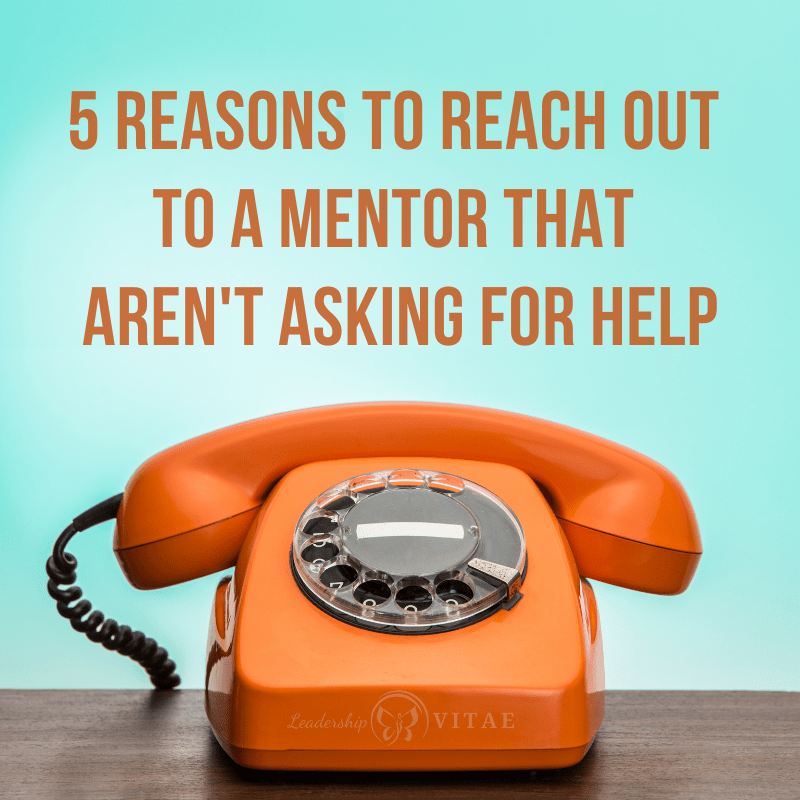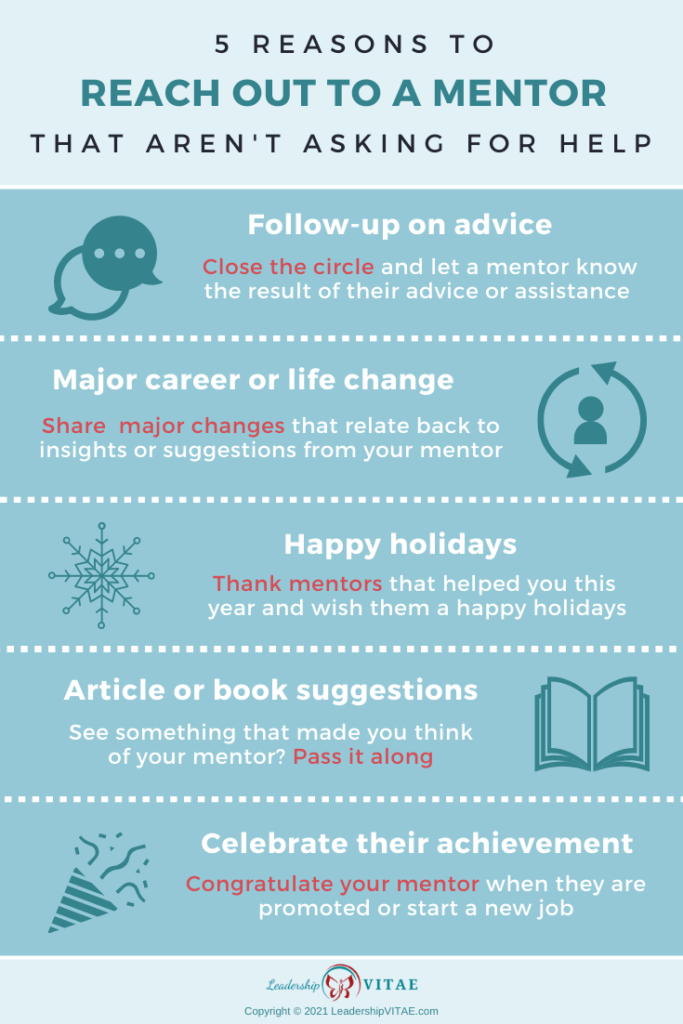
For many of us, it’s easier to offer help than ask for it. We may worry about being perceived as needy, opportunistic, or takers. Especially when it comes to our mentors. Those whose help we most want but may worry about going to the well too many times.
In the book “Give and Take,” Adam Grant references three types of people: Givers, Takers, and Matchers. Givers and Takers are self-explanatory. Matchers are those who attempt to evenly give and take.
For a long time, I focused on giving and rarely – if ever – asked for help. Then one of my mentors called me selfish. She said I was hording the good feeling of giving, and not allowing those in my circle to feel the same.
I slowly started allowing others to give as well, but worried about balance. When it comes to mentors, I often worried what I was giving back in return for the wonderful advice and support they offered.
Over the years, I have asked my mentors what would be meaningful to them, as well as considered what I would find meaningful from my mentees. The following is a collection of reasons to reach out that aren’t selfish. That add a bit of reciprocity to the mentor/mentee relationship.
That way, the next time we consider reaching out to our mentors, we’ll be less likely to hesitate. Less likely to think of ourselves as takers in a relationship we value.

1. Follow up from a specific discussion
Ideally, every time we meet with one of our mentors, we are thanking them for their time after the conversation. However, what about later when their advice or assistance bears fruit?
A CIO I worked for shared that she’s always happy to help her mentees. It makes her feel good, but only if she knows that her efforts mattered. Often, the circle isn’t complete because she doesn’t hear back. That precludes her from realizing the good feeling of giving.
Reaching back out to our mentor about how their specific advice or assistance helped us is critical. Mentors have finite time, and they are spending it on helping us. When they do, it’s not with a payment in mind. However, when we share how we achieved a goal due to their assistance, we’ve given them an energizing gift that they can reinvest in others.
2. Major career or life change
Maybe it’s been a while. We move forward and move on. Mentors may shift as our careers do.
Even as time has passed, mentors are often overjoyed to hear from someone they’ve helped. If their advice and insights offered long-term impact? Even more so.
If we have a major change in our lives, one that links back to advice and support from our mentor, it’s worth sharing with them. Years ago, a mentor said, “As you grow into and evolve your leadership approach, you’re likely to run into X [a certain challenge].” She offered a few considerations when the time came.
The challenge she predicted indeed came to pass. I worked through it, keeping her considerations in mind. On the other side, I reached out and let her know how her words helped me navigate that part of my journey.
As we experience changes that we can tie back to discussions with our mentor, we can let them know how their insights helped us get to that next step.
3. Happy holidays
During the holiday season, we think about our loved ones and who we are grateful for in our lives. Mentors should be on that list.
We can reflect on the year and thank those that helped us along the way. As part of celebrating gratitude in November or an annual reflection in December, consider who has lent an ear or provided a key piece of advice.
With that list in hand, write an email, mail a card, or even purchase something small and meaningful for those that have had the most impact.
Over the years, I have delivered cards, framed photographs I have taken, or cookies I’ve baked to those that have had the greatest impact on my life and career. The size isn’t what’s important, but the feeling behind it. Kind words of thanks last long into a new year.
4. An article or book suggestion
We often leave meetings with mentors buzzing with energy to put their advice into practice. Their insights are fresh in our minds, and we’ll start seeing articles, books, and more tied to what we heard.
It’s like buying a new car. Once we pick a make and model, we’ll see it everywhere. Because it’s what’s in the forefront of our minds. Conscious thought influences what we see, even if it’s right in front of us.
We have an opportunity to also consider what the mentor is interested in as we leave those sessions. When they share information about personal and professional interests, we can keep them in mind as we go about our lives and work.
Later, when we see something tied to their interests, we can notice and send it over. Maybe it’s a book recommendation, or an article. This demonstrates that we are not only listening for our own benefit, but our mentor’s as well.
5. Congratulations on their achievement
Maybe we know our mentor through work and hear about their promotion or role change. Or we are connected on LinkedIN and see something pop up about a new company they’ve joined. Our mentor’s achievements are an opportunity to congratulate him or her. Not in a stalker kind of way (I’m watching you) but in a supportive way.
This is a tricky one. We want to make sure we’re being sincere in our joy for their achievement, and not using this to help ourselves. It’s not about staying connected as they progress in their career, but about celebrating them as they have likely celebrated us.
Building bi-directional mentoring relationships
In these examples, the intention is to choose moments to intentionally center the mentor. To remember that while the mentor may be helping us, the best mentoring relationships are bi-directional.
Reciprocal relationships are not about keeping track of who’s giving and taking. Instead, we want to remember we are more than a recipient of wisdom. That we can be a provider of insight, joy, or support as well.
The moments that stand out most in my relationships with my mentors are joy moments. The ones on their faces, when they realized how their words transformed me or I picked out just the perfect small thing to brighten their day. That good feeling of giving has stayed with me as long as their wisest words.
Has it been a while since you thanked your mentor, or let them know how their words have impacted your life and career? Consider reaching out and letting them know. Your relationship will be all the better for it.
What other ways have you connected with your mentor to give back to the relationship? Please share your examples in the comments. And if you found this article insightful, please consider posting it to your social feeds.








